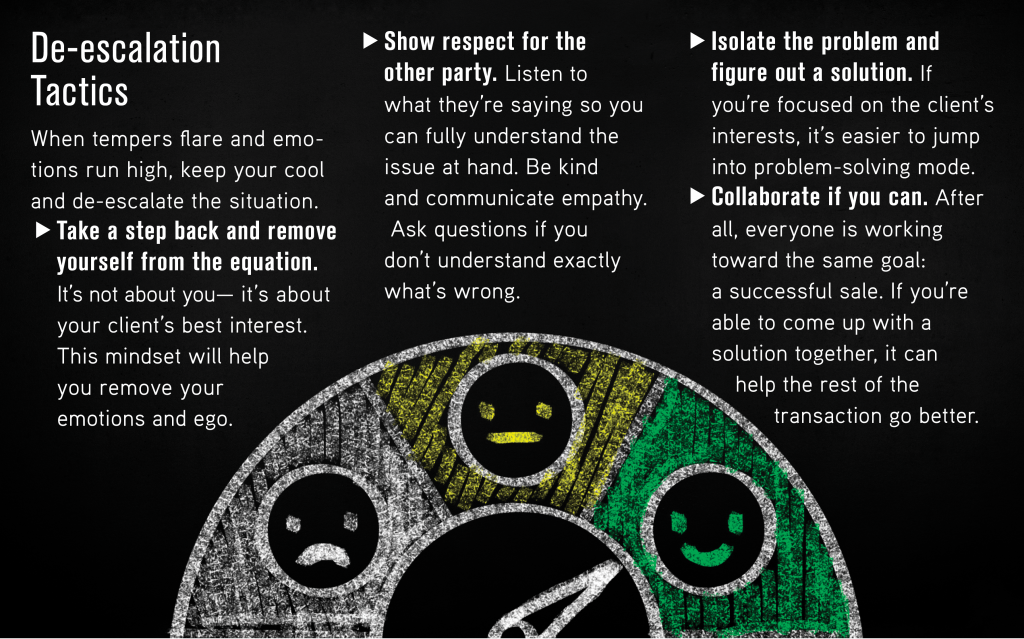CRSs can find themselves in positions where their expertise in real estate far outweighs that of the agent across the table
By Kathleen Hagan
The Certified Residential Specialist (CRS) Designation is awarded to top-producing agents who meet the strict requirements necessary for achieving the designation.
With advanced education, training and experience, CRSs have earned the reputation of being the best of the best—they are consummate professionals.
So it may come as no surprise that more often than not, the agent on the other side of the deal is not a CRS. Additionally, with the high agent turnover rate and a growing number of REALTORS® in the business, there’s a good chance the person on the other side might be fairly new to the real estate profession, too.
When emotions, ego and inexperience are brought into the mix, unprofessional behavior can ensue. The stakes are high in real estate, and often there are unforeseen bumps in the road when closing a sale. But CRSs are problem-solvers who must act in the best interest of their clients, maintain their professionalism at all times and rise above any unseemly behavior from other parties. They must remain calm, cool and collected.
“Our clients recognize excellence and professionalism,” says Tim Kinzie, CRS, founder of Montlor Luxury Realty in Cary, North Carolina. “If you conduct yourself as a professional, hold yourself accountable and work as hard as you can to get the right results for your clients, that speaks volumes and will drive referrals and result in success over time.”
Here are seven strategies for CRSs to maintain their professionalism and get the job done when the agent on the other side of the deal isn’t playing nice.
Take the lead.
Robert O’Meara, CRS, of O’Meara Real Estate Group with Keller Williams Realty in West Hartford, Connecticut, goes into each transaction with the mindset that he might need to manage both sides of the process. He’s not just consulting his own client—he’s ready to advise everyone involved in the deal if necessary, including the other agent, lenders, attorneys and so on.
“I’ve worked with other real estate agents who didn’t know how to handle certain parts of the transaction, and I’ve had to help them through the process,” O’Meara says. “Sometimes, they’re not trying to be unprofessional—they just might not know enough [about real estate] yet. So instead of getting angry when something goes wrong, I try to help them along and keep them on track.”
Kill them with kindness.

It’s more difficult to be mean to someone who is acting extremely nice to you. When reaching out to another agent for the first time, Sarah Malarkey, broker with NextHome Realty Connection in Portland, Oregon, starts by introducing herself and complimenting the other agent and their listing. This positivity and warmth helps foster a collaborative and productive relationship from the get-go.
“I like to treat people as if they’re an old friend,” she says. “Many REALTORS® feel the need to be aggressive from moment one, but I’ve learned that it’s all about relationship building and treating others the way you want to be treated.”
Lilli Schipper, CRS, broker associate at LoKation Real Estate in Hollywood, Florida, agrees. “Being aggressive doesn’t help,” she says. “You always want to be friendly and positive to everyone, since we are all working toward the same goal. You want to have everyone working together so you can get what’s best for your client.”
Being kind can be especially fruitful in multiple offer situations or in smaller markets where you’re bound to work with the same agents again and again. “If you’re warm and welcoming, other agents might be more inclined to work with you and your clients,” Malarkey adds.
Make no assumptions.
Just because someone yells, swears, hangs up the phone or walks away doesn’t necessarily mean a working relationship is doomed. “Maybe there’s something going on in their life, like illness or financial trouble, that has nothing to do with the transaction. Don’t try to judge somebody based on one event,” O’Meara says. “Recognize they could be having a rough day.”
Isolate the issues.
“One of the primary things we can do to fix problems is contain them,” Kinzie says. “As we’ve learned with COVID-19, if you don’t contain or isolate issues and you just let them proliferate, it results in a worse outcome.”
O’Meara agrees. “It’s one of our biggest jobs as REALTORS® to isolate the problem and find a solution,” he says. “Problems come up every day in every transaction, and it’s our job to solve them.”
Communicate clearly and often.
Schipper is a huge proponent of documenting everything important via email. “I average around 400 to 500 emails per client because it’s the best way to hold everyone accountable,” she says.
Kinzie likes to send frequent emails with the next steps laid out to every single person involved in the sale. “My intention isn’t to babysit, but to make sure we’re operating ahead of schedule,” he says.
But for situations that require tact and setting the right tone, don’t be afraid to pick up the phone. “I’ve always found the best way to resolve differences is to talk things through,” says Linda Pilmer, CRS, designated managing broker at Pilmer Real Estate, Inc., in Aurora, Illinois. “Email and text are extremely convenient, but they can throw information out of context,” she warns. After a phone conversation, send a follow-up email to ensure the communication was clear.
Remove your emotion and ego.
There are times when emotions can run high, but keeping the client in mind can help you remain professional when your first instinct is to react. “When emotions get out of control, the No. 1 ingredient that’s often missing is one party’s belief that there is a lack of empathy and understanding of the issue at hand,” Kinzie says. “So rather than mirroring the behavior, CRSs should communicate empathy and understanding and hold themselves accountable for correcting the situation.”

Get some perspective.
If a situation starts to get heated, O’Meara recommends typing out an email with your thoughts but not sending it right away. “Give it at least an hour,” he advises. “It feels good to fight back in the moment, but I’ve written a lot of emails that I’m really glad I didn’t send because they ultimately weren’t in the client’s best interest.”
At Montlor Luxury Realty, Kinzie has a weekly all-staff meeting where everyone shares an issue they’ve encountered that week, and the rest of the group listens and provides advice. “Oftentimes, the closer a person is to an issue, the more blind spots they have,” he says. “By talking things out, we are able to leverage the experience and perspective of other agents and we are held more accountable for our actions. In turn, that makes us more professional.”
Overcoming the Sticking Points
Is there a particular part of the real estate transaction when things seem to break down time and time again? For Tim Kinzie, CRS, founder of Montlor Luxury Realty in Cary, North Carolina, it’s the appraisal not being completed on time.
“Real estate transactions are stressful, so you want to avoid extensions in the 11th hour,” he says. “Anything that doesn’t go according to plan is going to worry people. No one likes surprises—they create friction. So we do everything we can to try to eliminate them based on our past experiences.”
To head off potential headaches due to a delayed appraisal, Kinzie takes a proactive approach and tells the other agent to order the appraisal at the earliest date possible instead of waiting until after the inspection takes place.
“We tell them to explicitly tell the lender and appraisal company that they don’t want it to occur before the inspection resolution deadline, but to have it happen as soon as possible afterward,” he says.
Completing the appraisal on time results in a much smoother sale. And if for some reason the appraisal is no longer needed after the inspection takes place, there’s only a $50 cancellation risk. “It’s well worth it to avoid any potential drama around it,” Kinzie says.
Perfecting negotiation skills can aid your professionalism in dealing with other agents. Check out Win-Win Negotiation Techniques for more strategies at CRS.com/catalogsearch.
Photo: iStock.com/da-kuk








